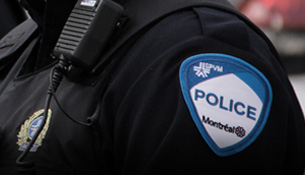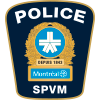
Sexual Assault
Sexual violence is unacceptable and you have the right to report such offences. A victim of sexual assault at any age is never responsible for their attacker’s behaviour.
If you are a victim, know that you are not alone. You will be supported when you decide to break the silence. At the SPVM, our priority is to ensure your safety and provide you with personalized support throughout the judicial process.
This section covers subjects that may be distressing. If you or a person in your circle of friends or family needs support, we encourage you to ask for help. Resources are available.
Main resources
- You are a victim or witness of sexual assault?
Report this situation to your neighbourhood police station.
- In an emergency, call 911
- Sexual Violence Helpline: 1 888 933-9007 (24/7)
- Crime Victims Assistance Centre (CAVAC) of Montréal: 514 277-9860
- DPCP info line on domestic violence and sexual abuse: 1-877-547-DPCP (3727)
- You are an attacker or engage in sexually violent conduct?
Consult the “Sexual offences and resources” tab and ask for help.
Sexual offences
Sexual assault is a sexual gesture committed by a person towards another person, without the latter’s consent.
Other sexual offences exist such as indecent acts, voyeurism and exposure. These offences do not constitute sexual assault.
Sexual offences are crimes and you have the right to report them.
Prevention
Learning about healthy sexuality and healthy relations is an important asset in preventing sexual offences. This learning can start in childhood.
- By listening – Listen to your inner voice, which may warn you about a potentially dangerous situation.
- By being assertive – You have the right to say NO. Set boundaries and do not hesitate to report any difficult or disturbing situation you experience.
- By maintaining your social network – Avoid isolating yourself and continue to see people you fully trust (family, friends, etc.). Surround yourself with respectful people.
- By being an active witness: By openly objecting to unacceptable behaviour, you are taking part in preventing sexual violence.
Seek help if you are experiencing sexual violence or abuse.
Consent
Consent must be:
- Free
You are the only person who can decide whether to consent or not. Your consent is not free if another person puts pressure on you, insists, threatens you or uses force.
- Informed
You should know exactly what is going to happen and what you agree to take part in. Your consent is only valid for the activity to which you consent at a given moment.
- Reversible
You can change your mind at any moment and your choice should be respected.
- Enthusiastic
You should be fully in agreement and at ease with what you are being proposed.
Consent is not valid if:
- The person is intoxicated (alcohol, drugs).
- The person is unconscious or sleeping.
- The person has changed their mind, shows discomfort or says no.
- The person has not clearly indicated their consent, through their gestures or words.
- A person uses manipulation, blackmail or threats.
- A person abuses a position of trust or authority.
Source: Directeur des poursuites criminelles et pénales (DPCP)
Legal age of consent
The legal age of consent in Canada is 16.
BEFORE AGE 16
To protect minors, the Law stipulates that consent is only valid if the other partner is not in a position of authority* and the following age gaps are respected:
- Age 12 or under
Cannot consent to any sexual contact
- Age 12 to 13
Can consent if the partner is not in a position of authority and is less than two years older than them
- Age 14 to 15
Can consent if the partner is not in a position of authority and is less than five years older than them
- Age 16
Can consent except if the partner is in a position of authority
* Position of authority
Some exceptions may apply, in particular in cases where there is a relationship of trust, authority or dependence. For example, a situation involving a coach, teacher or employer.
What should I do if I am a victim?
- If you are victim of sexual assault, you can call 911 or contact your neighbourhood police station.
- If you have been a victim of a recent sexual assault (0 to 5 days), it is recommended that you go to one of the designated centres as soon as possible to receive medical and psychological help. It is possible in some cases to be accompanied by a police officer to take you there.
- To help the medical team collect evidence at the designated centre, you should ideally:
- avoid washing yourself;
- avoid washing your clothes, bedding or any other object than may contain DNA;
- avoid urinating;
- avoid drinking or eating.
If already done, don't worry: you will have access to care and services.
- If you are aware that a perpetrator of sexual violence does not comply with their conditions, report it to 911. You can make this type of report on an anonymous basis. If the individual does not comply with their conditions and the police is informed, an investigation will be conducted and charges may be brought.
Filing a complaint
The victim is NEVER obliged to file a complaint. They have the choice to file a complaint or not. The experiences that they have lived, consequences of trauma and emotions that they feel may considerably influence their decision.
The victim can:
- Call 911 if they are in an emergency situation or if their safety is in danger;
- Go directly to their neighbourhood police station.
If the crime took place outside the island of Montréal, the report will be passed on to the police force for the territory concerned and an investigation will be launched.
A friend, family member or social worker may accompany the victim to meet the police, apart from when the facts surrounding the case are covered.
There is no time limit for filing a complaint. However, some time limits apply for submitting the case file to the court.
Processing a police complaint
1 - Reporting the case to the police
Patrollers are responsible for taking the victim’s statement, making the victim safe and ensuring that they receive appropriate care. The patrollers will firstly complete an event report. They will then recommend that the victim goes to a designated centre to collect samples and receive medical and psychological help (forensic kit). The event report will then be passed on to the Section des agressions sexuelles.
2 - Police investigation
The Section des agressions sexuelles is responsible for the police investigation and collecting evidence. The investigator will become the resource person for the victim. The duration of the criminal investigation may vary. The investigation report will subsequently be submitted to the Directeur des poursuites criminelles et pénales (DPCP) for assessment by a prosecutor specialized in sexual crime.
3 - Request to institute court proceedings
A meeting between the victim, investigator and prosecutor will be held to explain the judicial process. The prosecutor will decide whether the evidence gathered is sufficient to prosecute the suspect or not. To facilitate the victim’s testimony before the court, the victim may be supported by CAVAC, which offers a witness program to help children and victims. Tools are also available to provide support to the victim in court proceedings: testifying from behind a screen or using a videolink; testifying with a support dog at your side.
Designated centres and kits
Designated centres
These designated centres offer services to victims of sexual assault 24 hours a day, 7 days a week.
1 888 933-9007 (Sexual Violence Helpline)
Forensic kits (0 to 5 days after the assault):
This kit helps to document the facts surrounding the sexual assault suffered and collect evidence (such as biological liquids). You should ideally go to the designated centre as soon as possible, even if you have not yet decided if you are going to report the sexual assault of which you were a victim to the police. The forensic kit will be kept for 14 days while you take your decision.
Medico-social kits (no time limit):
This second kit helps to document the facts surrounding the sexual assault suffered. It does not require any samples to be taken. You should nevertheless make an appointment before going to a designated centre (Sexual Violence Helpline 1 888 933-9007). Victims are supported by a multidisciplinary team. Medico-social intervention is offered to all victims of a recent sexual assault, regardless of whether or not they decide to report the sexual assault to the police.
Sexual offences and resources
National Sex Offender Registry
The National Sex Offender Registry is used to help police services prevent and investigate crimes of a sexual nature, while respecting the Canadian Charter of Rights and Freedoms.
Obligations on sexual offenders:
- Initial registration with the Registry
7-day time limit to make an appointment by phone at 514 280-8503. On the day of your appointment, you must go in person to 10351, rue Sherbrooke Est in Montréal, for your registration to be carried out.
- Annual registration with the Registry
After the 11th month and at the latest one year after the date of your last registration, make an appointment by phone at 514 280-8503 or via rvregistre@spvm.qc.ca every year for the number of years stated on your order(s) (10 years, 20 years, lifetime).
If your home address is located outside Montréal, contact Sûreté du Québec on 1-866 958-4636.
Resources



